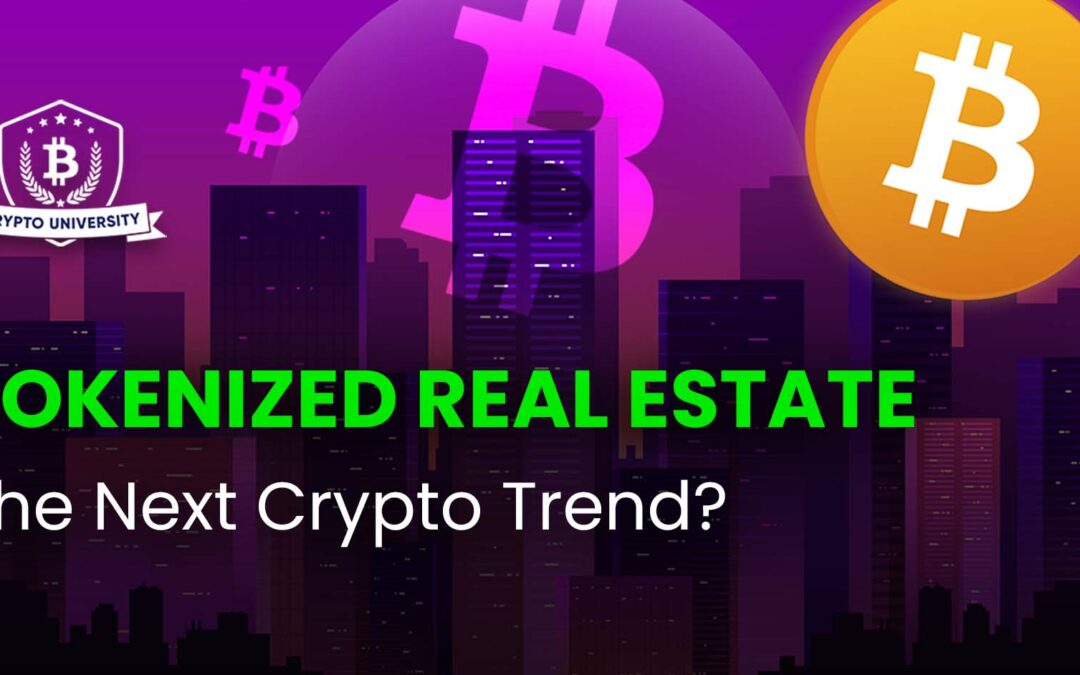We saw tremendous growth in the cryptocurrency space in 2021. Many new trends came and went: the shitcoin phase, the NFT craze, the rise of the metaverse. How likely is it that these trends will continue through 2022? There are so many use cases for blockchain technology, the possibilities are endless. Something that seems to be overlooked currently is tokenized real estate – and no we aren’t talking about metaverse property.
Real Estate Tokenization
The traditional way to claim ownership of a property usually entails some type of legal registration and a lot of paperwork (or maybe e-files). There is now the act of tokenizing physical property and storing the ownership of the tokens on a blockchain. Similar to how NFT’s display ownership of images, songs and videos, they can display ownership of physical properties. When NFT’s were heavily trending, there wasn’t particularly much hype around tokenizing physical properties. It’s very possible this will become a much more expansive frontier in the months and years ahead.
An interesting characteristic of tokenized properties is the ease of accessibility to a new group of investors. Generally, an investor would have to have tens of thousands of dollars to purchase their first property, or take out a substantial loan in order to acquire a property. Then there would be potential costs of renovation, maintaining renters for the property, and a few other obstacles to overcome before investors can return a profit.
Through the tokenization of properties many of these obstacles can be deleted. Actually, this provides advantages to investors such as lower minimums, liquidity, and blockchain security. Now an investor can claim partial ownership of a property with tokens, and even receive daily rental income. The sale and transfer of these tokens can be done amongst individuals, and all payouts can easily be forwarded by the ownership of the NFT. This incredible feature provides much more liquidity to the market. Ownership of these NFT’s can not be forged or infringed as the information is stored on a digital ledger instead of a centralized data cloud. Investors do not have to wait for a certain time to elapse before collecting their rental income due to the ease and speed of transferring funds over blockchain (as opposed to traditional bank transfer times).
To be transparent, there are some legal restrictions (depending on your country of residence) to be able to buy and sell these tokens. In the case of the USA, it is more like fractional real estate investing in the legal sense as the property isn’t actually tokenized, but rather the LLC that owns the property is tokenized. The LLC is then fractionalized into “x” amount of tokens and stored on whichever blockchain desired. After an LLC is tokenized, the ownership of those tokens can be distributed to investors and thus represent the ownership of a property.
Let’s take a look at LoftyAI, a website that is currently handling tokenized properties.
Here we can see a list of properties that are currently being tokenized and available for purchase. Most of these properties require only a minimum investment of just $50 USD equivalent to enter the market. LoftyAI makes use of the Algorand blockchain to handle transactions and store ownership tokens.
In the above image you can see what a listing looks like on this website. Available information to investors includes address of property, a description of the property, the total cost of the property, token price, number of tokens, and other financial statistics regarding fees and profits.
After one decides to become a tokenized property owner, the NFT is transferred to the wallet address of the buyer. Then they can sit on the token and reap the daily rental benefits or decide to sell the token to someone else after the property appreciates in value. With investments such as these being made more available it provides investors of all sizes greater opportunities to acquire wealth.
If this sounds interesting to you, stay tuned to our blog publications as we look to cover the process of making your first tokenized property investment.
By viewing any material or using the information within this publication you understand that this is general education material and you can not hold any person or entity responsible for loss or damages resulting from the content or general advice provided here. Trading cryptocurrency has potential rewards, but also potential risks. You must be aware of the risks and be willing to accept them in order to invest in the markets. Only trade with funds you can afford to lose. This publication is neither a solicitation nor an offer to buy/sell cryptocurrency or other financial assets. No representation is being made that any account will or is likely to achieve profits or losses similar to those discussed in any material on this website. The past performance of any trading system or methodology is not necessarily indicative of future results.
Written by Edward Gonzales © Crypto University 2022
